Learn with PADI conservation diving in the stunning Perhentian Islands!
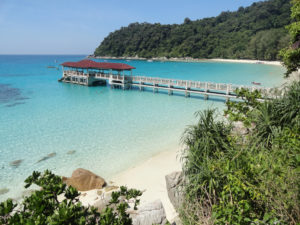 You can learn to dive with PADI conservation diving at the Perhentian Marine Research Station. This is an established marine project in partnership with Reef Check Malaysia and the national Marine Parks Department. Following your PADI course, you can join the dive team. Then you can do a range of conservation activities, such as coral reef restoration and seagrass surveys.
You can learn to dive with PADI conservation diving at the Perhentian Marine Research Station. This is an established marine project in partnership with Reef Check Malaysia and the national Marine Parks Department. Following your PADI course, you can join the dive team. Then you can do a range of conservation activities, such as coral reef restoration and seagrass surveys.
Marine conservation for beginners and qualified divers!
As a PADI conservation diving volunteer, you will get to contribute to several hands-on activities, including surveying and mapping the local seagrass (a vital feeding ground to sea turtles) and developing artificial coral reefs.
Moreover , you can research the effectiveness of the new reefs as a home to fish. The project team collaborates with University Malaysia Terengganu and Plymouth University. All data is actively being used to shape decisions about the protection of the coral reefs and seagrass beds in the park by the local authorities.
During your stay, you will enjoy the local culture of the village you are based in. You may also get involved in the local community work such as Eco Snorkle guide training, beach clean ups, buoyline maintenance, recycling and other activities.
• INCLUDES ACCOMMODATION, MEALS AND ALL ACTIVITIES with Staff Supervision.
• MINIMUM AGE: 18 and above
• DURATION: 1 to 4 weeks
• OPERATION: From April to September
(outside Monsoon season)
VOLUNTEER ACTIVITIES:
♥ LEARN TO DIVE WITH PADI
♥ VOLUNTEER FOR MARINE CONSERVATION
♥ RESTORE CORAL REEFS
♥ DO OCEAN SURVEYS IN CRYSTAL CLEAR WATERS
Rm 3,900 for 2 weeks (beginner) with PADI course for 1 week
Project activities
Seagrass Surveys and Mapping
Sea turtles depend on seagrass beds as vital feeding grounds. Since 2015, project staff and volunteers have been researching the local sea turtle population and have made a remarkable discovery that only the migrating turtles (some from as far as Vietnam) use these feeding grounds, but turtles that come to nest here do not. More information is needed about the location and boundaries of these seagrass beds, so they can be mapped and studied.
You will help the staff to continue this crucial task by conducting dive surveys to identify the seagrass beds and map them using GPS. Working to global standards set by Seagrass-Watch, you will determine the percentage of cover and the condition of seagrass beds around the islands. Research undertaken through conservation diving will also shed light on the epiphytes (algae) that live on the seagrass.
Assessment of the Artificial Reef
In 2013, several artificial reef structures were sunk on the edges of the marine park to create new fishing grounds for the local villagers. The aim is to reduce the pressure on the natural reefs where the villagers currently fish for their livelihood. These new artificial reefs require continuous monitoring to assess reef growth and condition, and for further improvements. Volunteers will assist in snorkel surveys to count fish and do video transects to establish the Fish Aggregating Devices (FADs).
Related Surveys
Information is also being collected to better understand the impacts on the local marine environment. Depending on timing, you may have the opportunity to collect data on sea temperature and water factors such as quality, turbidity, salinity, wave height and others.

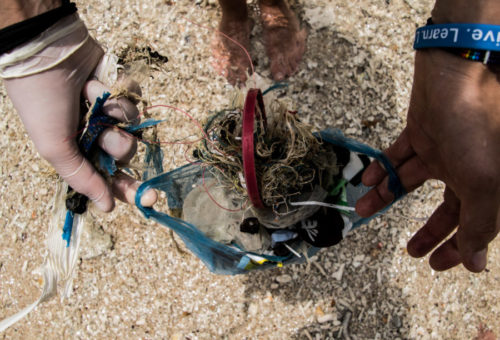
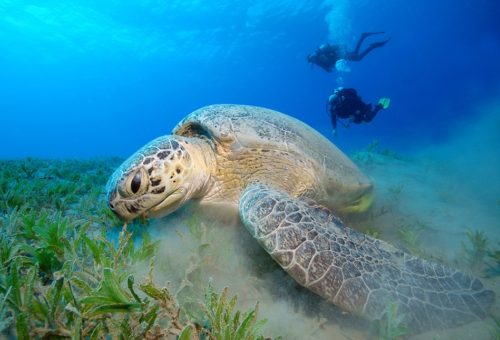

PADI Dive Course
Whether you’re an absolute beginner diver or want to upgrade your diving skills, our PADI dive centre partners can support you. Alternatively, you could do the PADI Open Water course in the UK before you travel. There is also the choice of Advanced or Rescue Diving courses. Each day, volunteers will have the chance to go on 1 or 2 dives in the morning and then the afternoon is reserved for data input or analysis, or more diving if needed.
Week 1 is generally dedicated towards getting your diving certification if you are a beginner diver. For more experienced divers, you will be trained in research surveys. The following weeks will be for the marine surveys.
Reef and Beach Cleanups
You will get involved with reef and beach cleanups once a week, which is usually conducted in collaboration with local dive shops, other Ecoteer projects, local authorities and different conservation organisations. The rubbish collected will be sorted on the ground, and the plastics are stored to be upcycled using the on-site plastic recycling machine.
Additional Activities
Staying in the local village, you will gain a good understanding of the local culture. You may also get involved in local community work including Eco Snorkle guide training, buoyline maintenance, recycling and other activities.

DATES:
All arrivals are on Monday, and departures on Sunday.
Start dates will commence from May until the last Monday in September
MINIMUM AGE FOR THIS PROJECT: 18 years
AVERAGE GROUP SIZE: 4-8 volunteers
PRICING FOR MALAYSIAN BOOKINGS
NO Dive Course
PRICING FOR INTERNATIONAL BOOKINGS
NO Dive Course
Our prices are in MYR Malaysian Ringgit. Please use a currency converter to calculate in your own currency at the daily rate.
For beginners, with a PADI course, the minimum stay is 2 weeks. Ask us about pricing for stays of 3 weeks or more here
PRICING FOR MALAYSIAN BOOKINGS
WITH PADI Course
PRICING FOR INTERNATIONAL BOOKINGS
WITH PADI Course
Includes:
- Transfers from and to Kuala Besut jetty
- Shared dorm-style accommodation
- Meals & Cooking Facilities
- All project activities
- PADI Scuba dive course OR 7 dives per week
- RM500 for carbon offsetting (international volunteers only)
Excludes:
- Flight fares
- Marine Park fee (Rm5 local, Rm30 foreigner), District fee (Rm5 local, Rm20 foreigner)
- Travel insurance
- Private transfers
- Visa costs
- Food/activities not included in the project
HOW TO BOOK

Accommodation
Your accommodation will be at the project’s volunteer house in the local village on the island! This is a comfortable house with a chill area, communal kitchen and shared room with bunk beds.
In Malaysia, it is not so common to have hot water supplied (on tap), as it is generally very hot anyway. So the lukewarm shower will help to cool you down. The cooking facilities will be basic, but adequate.
Food
Breakfast tends to be simple; for instance bread, coffee or tea and peanut butter or jam. Lunch and dinner is usually cooked at the project house. Feel free to use the project’s weekly shopping supplies to create a tasty meal for yourself. Volunteers are also welcome to explore some of the delicious local restaurants to try traditional Malay dishes – for instance, Roti Canai is a popular and yummy Malaysian breakfast dish.
Staying with other volunteers means everyone take turns to prepare dinner once a week and all pitch in to clean afterwards! Our volunteers come from around the world, so this is also a great opportunity to cook and sample cuisine from different countries. For a true taste of Malaysian cooking, the project also hosts a weekly Malay meal with a local family; a truly unique experience to try authentic dishes and learn about the Malaysian culture.
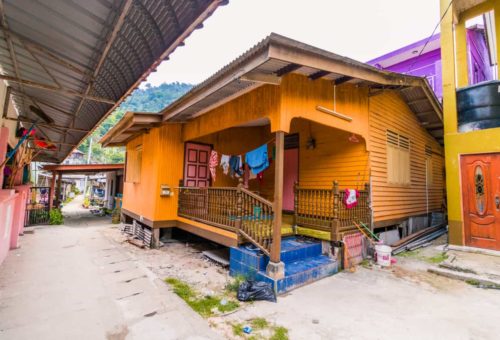
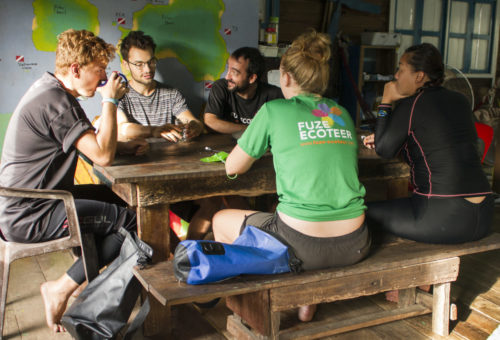
HOW TO BOOK

Successes to date…
The Perhentian Islands’ shallow reef communities and seagrass beds are subject to increasing pressure from human impacts, especially the rapid expansion of the local tourism industry. Hence, The Perhentian Marine Research Station (PMRS) officially started in February 2017 to assess diver impact on coral reefs along with being involved in work to implement and encourage the conservation of coral reefs, and waste management around the islands.
The project hosts international and local volunteers with the opportunity to get involved in their conservation projects in return for a financial contribution towards project costs. Through this scheme, volunteers contribute useful data for coastal zone management with little or no demand for other external resources.
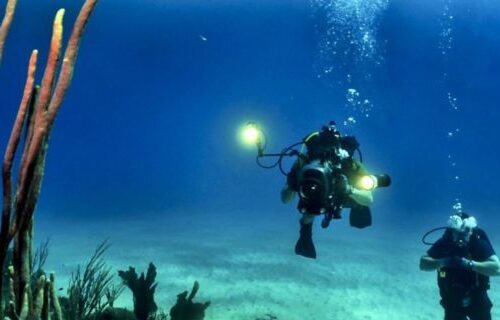
Annual project achievements:

Research
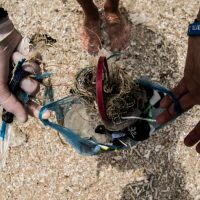
Conservation
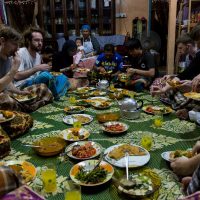
Community
HOW TO BOOK

Requirements
What are the requirements to join this program?
Volunteers must be over 18. You will need to have a positive attitude, participate in all volunteer activities and respect the local village culture and traditions. You are also required to help out with any house chores during your stay on the island.
Do I need any diving qualifications or experience?
Nope! If you have never dived before or don’t have an open-water qualification, you simply arrive a week before the qualified divers and complete your open-water and/or advanced open-water qualification in an established dive centre on the island (included in project price). A week later you will start project activities with other qualified divers so that everyone is at the same level.
Who can volunteer with the project?
Anyone 18 years old and above may join. Unfortunately, this project is not suitable for children. Families with children 18 years old and above are welcomed to join.
Project Information
What is the mission and vision of the project?
The Perhentian Marine Research Station (PMRS) is a small scale research and conservation station, which focuses on coral reef conservation and liaising with dive shops and resorts to introduce waste management initiatives around the islands. The project also conducts marine research and surveys to protect the island’s vulnerable coral reefs and seagrass beds and thus help save the ocean.
How long does the dive course take?
Theory would take around 1-2 days. Actual course would take 3 days for Open Water, 2 days for Advanced Open Water and 3 days for Rescue Diving.
What is a typical day at the project like?
So much to do, so little time! Volunteers would be diving alongside the project’s team to conduct marine surveys during the day. You will also get involved with beach cleanups with plenty of opportunities to soak up the sun. Volunteers are generally free in the evening. Volunteers will get to prepare food with the team and eat together. It is the perfect time to blend all culture and dive stories together.
Is there a sample itinerary?
Week 0 – Dive Course
Unqualified divers arrive Monday and complete dive course including 1 extra buoyancy dive and 1 fun dive.
Weeks 1 onwards – Research Training and Survey Weeks
Qualified divers arrive on Monday, and conduct:
1 survey skills & buoyancy dive
2 coral nursery dives
2 shark photo ID dives
2 Reef Check Malaysia survey dives (fish/invertebrates & substrate/coral health)
1 Seagrass Watch survey dive
Sundays are departure day or off day if volunteers are staying for more than a week.
Insurance, Visa and Vaccinations
Do I need insurance?
We highly recommend travel insurance to safeguard against sickness, loss of money, flight delay/cancellation or lost baggage. Feel free to message us for further advice.
How deep will the dives be? (For insurance purposes)
Dive sites around the islands are no more than 25m. Most sites we conduct our surveys at are 10-15m, and that is the main depth we will be diving. We will only ever dive to that divers qualification eg. Open Water Divers to 18m, and Advanced Open Water Divers to 30m.
Do I need visa?
Visitors from the following countries will receive a 90-day free tourist visa upon arrival in Malaysia:
Albania, Algeria, Argentina, Australia, Austria, Bahrain, Belgium, Bosnia-Herzegovina, Brazil, Canada, Croatia, Cuba, Czech Republic, Denmark, Egypt, Finland, France, Germany, Hungary, Iceland, Ireland, Italy, Japan, Jordan, Kyrgyzstan, Kuwait, Kyrgyz Republic, Lebanon, Liechtenstein, Luxembourg, Morocco, Netherland, Norway, Oman, Peru, Poland, Qatar, Romania, St Marino, Saudi Arabia, Slovakia, South Korea, Spain, Sweden, Switzerland, Tunisia, Turkey, Turkmenistan, United Arab Emirates, United Kingdom, United States, Uruguay, Yemen.
Do I need vaccinations?
You may need some vaccinations depending on your previous vaccination history. Please refer to your GP or a travel clinic for further vaccination advice.
Project services
Should I bring my own dive equipment?
You are welcome to bring your own dive equipment. But, the project has most of the diving gears that volunteers would need on site such as masks (non-prescription ones only), fins, neoprene boots and underwater camera.
Should I bring my dive computer/timer?
It is advisable to bring one if you are staying for a longer period. Unfortunately, we don’t have any. However, volunteers will always be accompanied by a dive guide. We do recommend volunteers to get a Casio F-91W watch on Amazon for between £7 and £10. .
What should volunteers bring?
Volunteers can refer to the project’s volunteer guide which includes a list of inventory that they should bring. This will be given upon booking with us.
Will I get support and guidance during my stay?
Of course! We are very proud of our friendly and talented team, who are happy to help throughout your stay. All of the project staff have amazing local knowledge and skill-sets, making them the perfect leaders and teachers.
Any further queries you have before booking can be resolved easily by contacting us directly.
Is there internet access?
Internet access is available at the project house.
Are there ATMs nearby?
There are no ATMs in the village. We advise you to use ATM machines in Kuala Besut before you arrive at the Perhentian Islands.
Travel arrangement
How do I get to Perhentians from Kuala Lumpur?
You can take a plane to Kota Bharu Airport (KBR), and then take a taxi to Kuala Besut Jetty. The taxi ride is approximately an hour. Taxis are available from the airport but please let us know if you need us to arrange one for you by emailing us your flight number and arrival time.
OR if you want to take a bus, you can purchase bus tickets from Terminal Bersepadu Selatan (TBS), Kuala Lumpur to Kuala Besut Bus Station. Alternatively, you can book online using Easybook. Buses normally travel overnight and it takes about 8 to 10 hours depending on the road conditions. Walk 5 to 10 minute from the Kuala Besut bus station to Save Park Holidays.
Please provide us with your arrival time prior as one of the Save Park Holidays staff will be waiting for your arrival at the office. From the jetty, you will take a 30-minute boat ride to the island. Boats leave from the Jetty at 8 am, 12 am, and 4 pm.
Important: Please do not take the boat with other boat operators as they may overcharge boat fees borne at the volunteer’s own expense.
Other Information
I have some specfic question about the project.
We are always happy to help you with any enquiries. Feel free to contact us.
